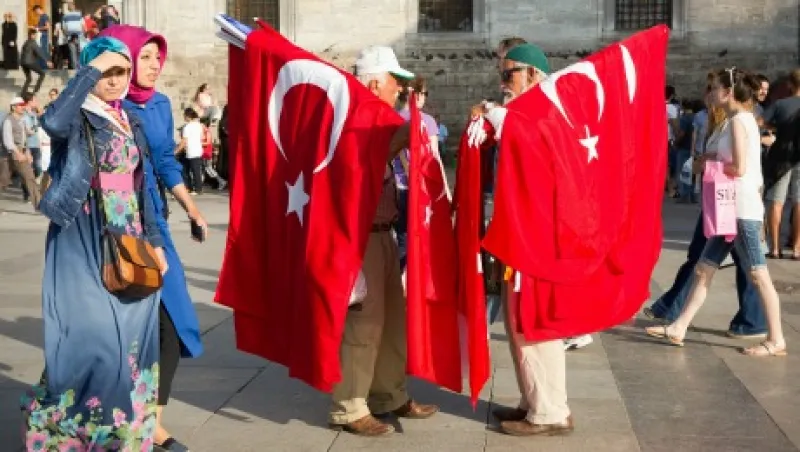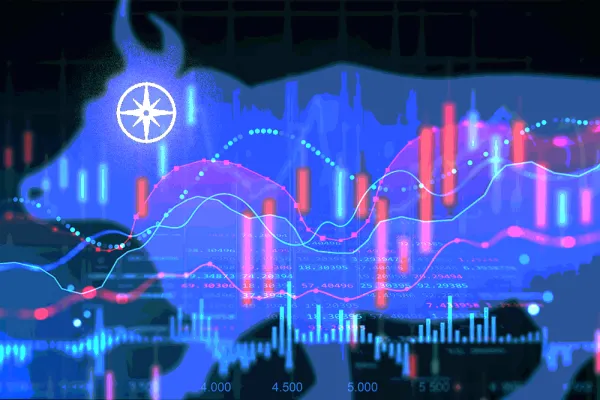Results show Prime Minister Recep Tayyip Erdogan holding a great enough margin to stave off a second round of voting, winning Turkey’s first direct presidential election on Sunday. According to results from Turkish news channels cited by the U.K.’s Guardian, he had 51.5 percent of votes — enough to prevent a runoff with his primary contender Ekmeleddin Ihsanoglu, who got 38.6 percent of the vote. But unlike the breakthrough electoral triumph that brought Erdogan’s Justice and Development Party, known by its Turkish acronym, AKP, to power 12 years ago, there’s little feel-good factor this time around.
The AK Parti, whose name is a double entendre in Turkish meaning white, clean, pure, was first voted into power in late 2002, filling a vacuum left by years of corrupt and ineffective coalition governments whose instability spooked investors who pulled out their foreign-exchange reserves, producing triple-digit inflation, and forced Turkey to turn to the International Monetary Fund for a bailout. The AK Parti government pursued business-friendly policies that stabilized Turkey’s finances and tamed inflation, and it embarked on accession negotiations with the European Union. Foreign investment poured into the country, which enjoyed an unprecedented boom that saw 5 percent average annual real growth in gross domestic product from 2002 to 2012, including a dip in 2009 during the global financial crisis.Yet a dozen years in power have also produced some unsavory side effects.
Several of those job-creating governmental construction contracts have been dogged by charges of favoritism and nepotism. For one, Kalyon Group, the business conglomerate in charge of, among other projects, building the shopping mall in central Istanbul’s Gezi Park that sparked mass protests across the city and throughout the country that garnered international support, is known for its close ties to the AKP inner circle. In December, Kalyon bought Sabah-ATV, one of Turkey’s main media groups. The media company’s previous owner was the Çalik Group, the CEO of which is Ahmet Çalik — Erdogan’s son-in-law. Before Çalik owned Sabah-ATV, there was Çiner Holding — until the TMSF, the Turkish equivalent of the FDIC, seized its assets in April 2007. Sabah, the group’s flagship newspaper, quickly changed its editorial line from AKP criticism to support. Dogan Group, Turkey’s largest media group — and Sabah’s main competition — which among other outlets publishes center and center-left daily newspapers Hürriyet and Radikal, fought off a total record-high $3.2 billion in fines that Erdogan claimed were tax evasion charges but Dogan argued were a front to put the non-Erdogan-friendly channels out of business. Dogan Group and oil-and-gas company Petrol Ofisi, also owned by the Dogan family, were temporarily delisted from the Istanbul stock exchange in 2009. The Dogan Group scored a partial victory the following year, getting some of the fines thrown out and paying the rest. Erdogan’s thumb has hit the country’s macroeconomy as well as left a mark on the press.
The Turkish lira, already down against the dollar after the Fed’s May 2013 announcement that it planned to begin tapering, was hit with the fallout of the December 2013 political scandal that led to the resignation of three members of Erdogan’s cabinet and uncovered some $17.5 million in money allegedly earmarked for bribes, gold smuggling and backdoor deals with Iran. Approximately $4.5 million of that total was found stuffed in shoeboxes belonging to Süleyman Aslan, the now-sacked CEO of Halkbank, the country’s third-largest state lender. Of the 91 detainees, several were C-level executives of development companies with government contracts. Erdogan foists the blame for the investigation on followers of Fethullah Gülen, an Islamic cleric with millions of supporters in Turkey and abroad who, given his enemy status with the Turkish military, has been in de facto exile in Pennsylvania since 1999. Given his religious following and his view that Islam can be interpreted in a pro-business context, Gülen and Erdogan were once close allies. But after news broke of the Halkbank scandal, Erdogan accused Gülen of trying to infiltrate and overthrow his government. A glance at Gülen-owned media such as Turkish-language Zaman or its English-language spinoff, Today’s Zaman, reveals that the editorial line has done a 180 from its onetime AKP ardency. In February, recordings emerged of what was apparently Erdogan telling his son Bilal to stash as much as $1 billion in cash with various associates, including Çalik.
Outside of concerns over structural cronyism, the country’s balance sheets are about as attractive as the Ottoman-styled uniforms that Turkish Airlines, which is nearly half-owned by the country’s government, was considering last year. Turkey’s current-account deficit is the biggest among major emerging-markets economies. Presently, it stands at $52 billion, accounting for some 6 percent of GDP.
In short, Erdogan has turned into Turkey’s problem rather than its solution. Ian Bremmer, founder of research and consulting firm Eurasia Group, said in a January interview with the Wall Street Journal that “Turkey is no longer an emerging market. The crisis in the country will only end when the country’s leader, Erdogan, quits.” Turkey’s heightened political tensions come at a time when the country can least afford it. The global financial turmoil sparked by fears of Federal Reserve tapering last year hit hard, causing the lira to fall by more than 20 percent and Turkish stocks to plunge by more than a third .
Plus, there is the tug-of-war between the Turkish central bank and Erdogan over interest rates. The central bank hiked the repo rate by a dramatic 5.5 points, to 10 percent, in January to stave off the steep decline following the shoebox investigation, bring inflation into check and do some Fed-taper defense. For one, it would keep up spending — and hence support more shopping malls, such as Kalyon’s complex slotted to go up in Gezi Park. Yet Erdogan wants the real interest rate at or scraping zero. Turkey’s inflation rate stood at 9.2 percent for the 12 months leading to June 2014. Erdogan has also hinted that low interest rates keep the economy away from usury, or the lending of money at excessive interest rates. (It’s notable that the AKP government plans to open Islamic banking subsidiaries at the country’s three state-owned lenders sometime in 2015. Islamic banking prohibits the levying of interest.) Questions of secularism aside, a low interest rate could turn off foreign investors, who may turn elsewhere for better returns, and undermine the lira. Considering that 90 percent of the country’s corporate debt is denominated in foreign currencies, a lira crisis is the last thing Turkey needs. Yet so far, Erdogan has prevailed. On July 17 the central bank cut the one-week repo rate 50 basis points, to 8.25 percent, bringing the total reduction since May to 175 basis points. The lira has stabilized in recent months: After hitting a post–shoebox scandal low of 2.27 against the U.S. dollar, it has been steadily trading around 2.10 since mid-April. The Istanbul stock market has made an even stronger turnaround since — or perhaps because of — the Halkbank furor: Spurred by cheap prices after the political fallout, investors started going on a buying spree in February. The Borsa Istanbul BIST 100 index surpassed 84,000 points on July 25, compared with levels of about 60,000 in late January, making for a six-month gain of some 40 percent.
An August 8 research note from Deutsche Bank suggested that markets aren’t immediately going to swoon at an Erdogan presidency. What could happen: Failing an AKP-opposition majority parliament — which for the near future does not look likely — Erdogan may have carte blanche to push through his policies, such as ultradovish monetary policy, or social ones, such as outlawing adultery, a bill that was up for debate in 2004 but was thrown out as part of the country’s EU accession bid. Now that Erdogan has won the election with enough of a margin to prevent a second round, he needs to name a new leader to form a government. He is hesitant to name specific candidates, although current President Abdullah Gül, Erdogan’s right-hand man, is likely not to be the new PM straightaway, as term limits would prevent him from running for Parliament until next June. The party may name a stopgap PM for the interim; a likely contender according to Hürriyet is former Minister of Transport, Maritime and Communication Binali Yildirim. One thing is certain, however: Erdogan wants to remain the sole head of the AKP. Along similar lines, Erdogan has suggested that he will run the country from the presidency, an unprecedented move from what was previously the office’s largely ceremonial role.
At first glance, a directly elected president would appear to be a step toward democracy. But the push for the constitutional amendment was largely the AKP’s doing. Despite outcry over situations like Gezi and AKP-backed social conservative decrees such as the latest comment to receive global derision, Deputy Prime Minister Bülent Arinç’s suggestion that women refrain from smiling and laughing in public, no clear political force has emerged to upend political Islamism throughout the country.
The candidacy of Erdogan’s primary presidential contender Ihsanoglu was a quiet admission from the opposition that an Islamist stood the best chance of knocking down the AKP leader.
Ihsanoglu was the joint candidate of the Republican People’s Party (CHP), the centrist, secularist party founded by Atatürk, and the Nationalist Action Party (MHP). The latter is a far-right nationalist party that recently has tamped down its decades of ethnopolitical rhetoric but maintains that Islam is a key facet of Turkish identity — just that in the MHP’s eyes the nebulous value of “Turkishness” takes greater precedence. Ihsanoglu, an Islamic scholar by training whose credentials include a degree from Al-Azhar University, Cairo’s bastion of religious education, just finished a term from New Year’s 2005 to January 31, 2014, as the secretary general of the Organization of Islamic Cooperation. Also running in the presidential elections was Selahattin Demirtas, the co-chair of the Kurdish-affiliated People’s Democratic Party (HDP), which under its umbrella includes leftist political groups as well.
Besides the 12th anniversary of the AKP’s initial election, 2014 marks a dozen years since soccer-crazed Turkey last qualified for the FIFA World Cup finals. The day was June 22, 2002. The place: Vatan Caddesi, an artery of Istanbul’s Aksaray neighborhood, one of the ancient city’s tattier districts. To the east are the standard bill-of-fare Istanbul tourist sights such as the Grand Bazaar, the Blue Mosque and the Hagia Sophia. To the north is the ultra religiously conservative Fatih neighborhood and the districts of Balat and Fener, home to the 550-year-old Ahrida Synagogue and the Greek Orthodox Patriarchate, respectively. In back is Sulukule, one of the world’s oldest Roma settlements — its older buildings now at risk of being bulldozed for new government development. Few areas in Istanbul are more diverse.
The name itself, “Nation Avenue,” is imbued with the post–World War I European nationalism out of which the modern Turkish Republic was born. On the street is the local tax office, a limestone-clad specimen of the finest architecture a mid-20th-century statist economy could buy. A four-story-high obligatory picture of Atatürk is hanging so that the Republic’s founder appears to be gazing over a same-size banner proclaiming in Turkish, “I love my country, so I pay my taxes.” The Turkish national soccer team kicked the winning goal in after extra time, beating Senegal 1-0 to advance to the 2002 World Cup semifinals. Within seconds, Vatan Caddesi flooded with adolescent boys waving the scarlet Turkish flag, yelling, “Gooollll!”
Despite the country’s economy run ragged and its collective distaste for politics after years of bungling, the 2002 World Cup was a unifying force. Erdogan and his AK Parti at the outset had spoken of its vision to do the same: embracing down-home, old-fashioned values while driving the economy forward. Part of the leader’s appeal throughout the outer-ring gecekondu, or shantytown, neighborhoods of Ankara, Istanbul and Izmir — and in the more conservative-minded provinces, from where many of these new urban residents had moved for a better future — was his image as a man of the people. Erdogan’s family is from Rize, a town on the Black Sea known in the country for its tea crop. He was born in and spent his teenage years in Kasimpasa, just downhill from the central Taksim Square and Gezi Park. The neighborhood is impoverished: It occupies the lowest-rent spot on the Turkish version of Monopoly. In a country where having a part-time job in high school is considered déclassé, he spent much of his adolescence selling simit — round twists of sesame bread. Erdogan went on to get his bachelor’s degree from the Aksaray School of Economics and Commercial Sciences (now part of Istanbul’s Marmara University). For a while he also played semiprofessional soccer — well enough to be recruited by Fenerbahçe, one of Istanbul’s three main teams.
Part of the role of the president, according to the Turkish constitution, is to promote unity across the country, a point on which Erdogan touched in his election-night speech on Sunday: “Unity in multiplicity and unity in society. I will be the president not just to those who voted for me; I will be the president of 77 million people.”
Perhaps Erdogan might want to get back to kicking that ball around.
Follow Anne Szustek on Twitter at @the59thStBridge.
Get more on emerging markets.






